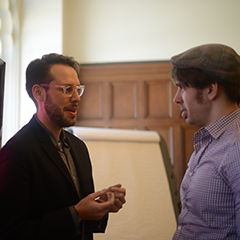Communicating your Knowledge as a GSAS Student

Your ability to communicate clearly will be the first and most noticeable trait in any professional interaction. Therefore, it is crucial to be able to speak, write, and think clearly before you are ready to face the professional world. Start working on communicating your knowledge today. Always understand your audience and tailor your communication plan accordingly.
Be sure that your CV or resume, cover letters, and applications are clearly written and targeted to your audience. Be aware that a CV and a resume share fundamental differences; the preparation of these documents is not simply a matter of applying a different document format or using generally related language between them. Since a CV is the standard professional document in academic settings, its purpose is to list your academic achievements to demonstrate your capacity make new contributions to your field of study and to communicate your expertise effectively in a teaching role.
Therefore, a list of original publications, courses you have taught, grants and awards you have won, committee work and other opportunities for university service you have participated in, and academic associations to which you belong will help to distinguish you from other candidates in an academic job market. A resume, on the contrary, emphasizes your skills and experience in previous professional roles. Rather than list achievements or underscore expertise, a resume should explain your goals, approach, and the results you achieved in a given professional position. A resume communicates how your actions translate to positive outcomes in professional situations you have navigated.
Always double check your spelling and grammar or ask a colleague to take a look. A fresh pair of eyes can save you from embarrassing errors.
When speaking in a professional setting, be sure to give yourself plenty of time to prepare what you want to say. Coming in with a plan, whether at a conference or job interview, will help you stay calm, exude confidence, and project yourself appropriately.
Curriculum Vitae/Resume:
Cover Letters
- How to write a cover letter - Basics
- Secrets to writing the best cover letter
- Cover letters for academic positions
Web Presence
Presentation Skills
- How to give a killer presentation (non-academic) - Harvard Business Review
- Quick Tips for Good Presentations (non-academic)
- 10 Tips for Academic Talks
- Highly Effective Lectures and Presentations
Informational Interview Tips